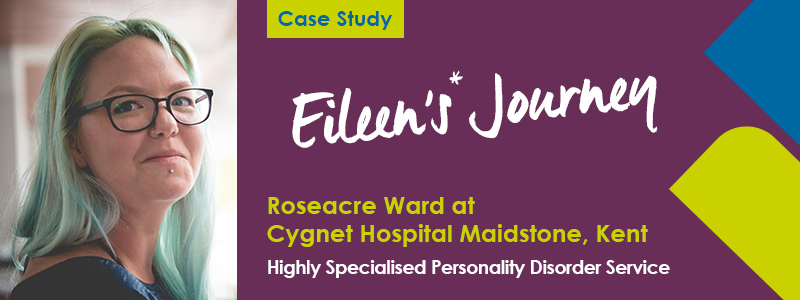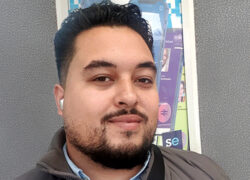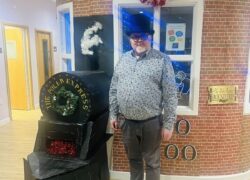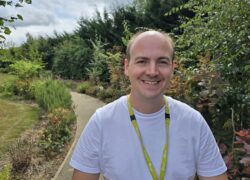
Eileen’s* history
Eileen had a very difficult childhood, with an unstable family home she witnessed domestic abuse as well as alcoholism.
Eileen started deliberately self-harming in her mid-teens, the same time that her eating disorder took hold. In her twenties she suffered from domestic abuse from her partner for over eight years. Eileen struggled to structure her time – life consisted of working, going home deliberately self-harming (DSH), uneasy sleep, and then returning again to work the next day.
After ten years’ intermittent contact with psychiatric services, including an extended period on a Psychiatric Intensive Care Unit (PICU), Eileen was in her early 30s when she was referred to Cygnet. She was diagnosed with Emotionally Unstable Personality Disorder (EUPD) and indications that a significant element of her distress was linked to post-traumatic stress. She spent eight months on acute and PICU wards in her most recent admission, but came to us highly motivated to engage with the Dialectical Behaviour Therapy (DBT) programme.
“When I came to Cygnet Maidstone I was detained under Section 3 of the Mental Health Act and I had a very difficult start. I used to get angry a lot, self-harming, punching walls, head-banging and ligaturing – anything I could do to get rid of the pain I felt emotionally. Back then I didn’t know that’s what I was doing, it was just my way of coping.”
When Eileen came to us
When first admitted Eileen struggled to cease self-harming, needing additional one-to-one care to keep safe. However, just two months into her admission, Eileen had settled and was engaging in groups to help her tolerate distress. We supported Eileen to learn new ways of coping where she was able to progress to groups which allowed her to develop skills in regulating emotions, with more general skills in interpersonal effectiveness following. Mindfulness sessions formed the basis for the impressive progress she made in the other areas of the DBT programme.
We took time to learn about Eileen’s interests and arranged a personalised gym programme and introduced other activities such as a Shop and Cook group, to allow Eileen to learn to choose a healthy balanced diet.
At times, Eileen experienced intense emotions which left her feeling unable to cope and defeated. We gave Eileen strategies to channel and express such feelings and she was also able to explore and change her relationship with alcohol through the substance misuse sessions provided.
Eileen’s care
Eileen was motivated by her goal of returning to work, and alongside volunteer work, she was able to become involved in the onsite Recovery College, our Service User-led Recovery/Education programme. Eileen took the lead in facilitating sessions and became good at supporting others, deploying her teaching skills and began appreciating her own strengths. She rented studio space and produced a song for World Mental Health Day.
Previous spells in hospital had progressed similarly well for Eileen, but on discharge she had repeatedly struggled to maintain progress and implement any of the strategies she had learnt, as a result a cycle of relapse and readmission would happen. Further therapeutic work to complete the DBT programme therefore seemed essential to allow Eileen to have a successful return to the community. Key to recovery for Eileen was being able to practice working with the new structures in her life with adequate support.
With the support of Eileen’s Care Co-ordinator and the CCG, Eileen continued as a voluntary service user and made a gradual return to work. With intense support from the inpatient team she was able to implement new coping strategies to deal with the routine trials and tribulations of a pressured job.
“Mindfulness I found a great help. It slows everything down and helps to clear your head. Learning all these skills has changed me into a calmer person. I’ve also engaged in trauma therapy. I had many flashbacks and intrusive thoughts before taking part in this therapy. Everything has become less intrusive so I can now lead a better life. Medication has also played a key to my recovery adding a mood stabiliser increasing and decreasing levels has helped to stabilise me.”
Eileen today
DSH did make a return as Eileen returned to work, which we were careful to approach in the spirit of tolerance, validation of her feelings, and not allowing a lapse to become a relapse. One strategy that worked particularly well was a series of laminated cards we produced with Eileen to remind her of a range of techniques she could deploy to try and cope with DSH urges.
Eileen’s discharge was delayed due to the COVID-19 lockdown and a period of low mood after some setbacks including losing her job. She continued to engage well through all this and, despite not being able to get out into the community or see her family, she refrained from self-harm for an extended period, which allowed her to complete a course of trauma work that would otherwise have been provided on an out-patient basis. She managed her urges to self-harm extremely well as this work progressed. Once it was possible to travel, she re-connected with family and friends.
As she prepares finally for discharge, Eileen presents to local healthcare teams and produces her own music. She has had no attendances at A&E or episodes of significant self-harm for six months, the longest period in recovery she can remember. Eileen now has a clear view where she wants to live once her Care Coordinator has sourced an appropriate supported living placement, and she has started a course with Open University, which she hopes will lead to qualification either as a Social Worker or Mental Health Nurse.
We can see Eileen excelling in this and gain enormous satisfaction using her personal experience of mental health problem to inform her work helping others facing similar difficulties.
“I’ve travelled a long way in my recovery here at Cygnet, I’ve learnt a lot about EUPD and how it effects my life. I started DBT and began learning about my emotions and what they mean. DBT psychology helped me to identify what I was feeling. I learnt about relationships and distress tolerance, how to distract my mind when I wanted to self-harm. I know through setting my life worth living goals I’m a step ahead of making my life meaningful again…If it wasn’t for the help of the staff I wouldn’t be here today.”
*Name has been changed to protect her identity




